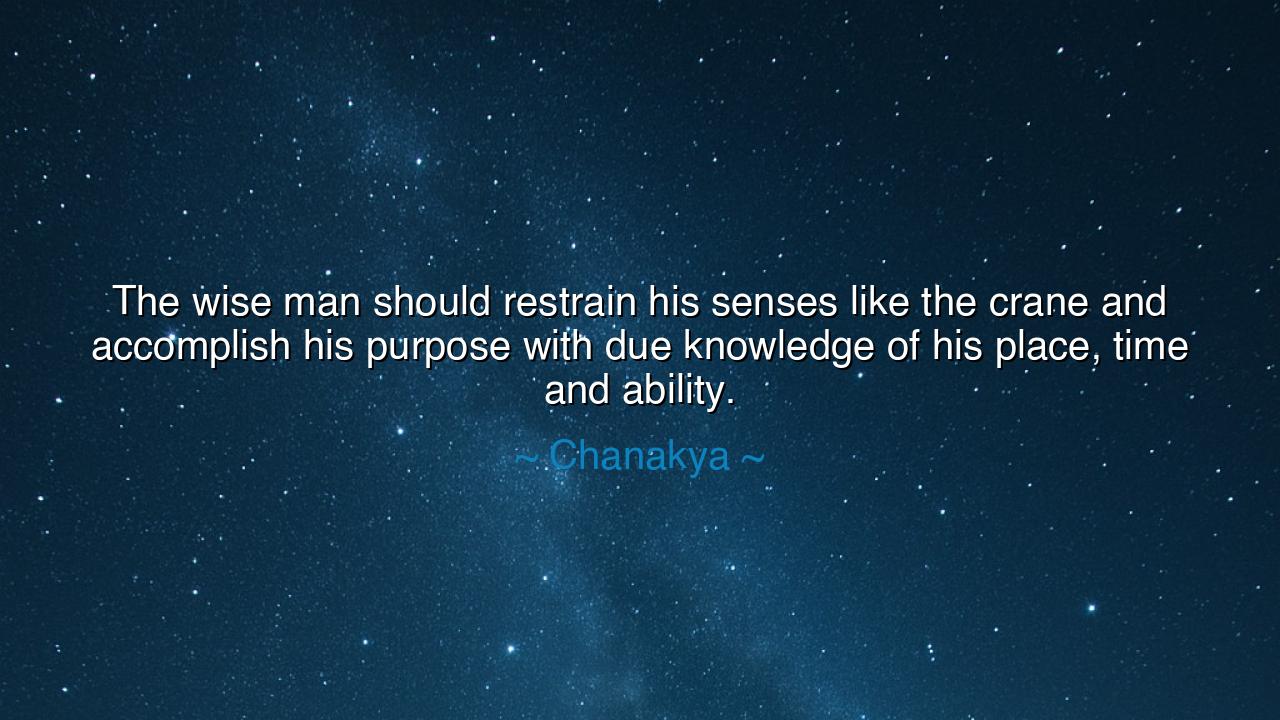
The wise man should restrain his senses like the crane and
The wise man should restrain his senses like the crane and accomplish his purpose with due knowledge of his place, time and ability.






Hear the timeless words of Chanakya, the sage and strategist of ancient India, who declared: “The wise man should restrain his senses like the crane and accomplish his purpose with due knowledge of his place, time and ability.” In this teaching lies the essence of self-mastery and cunning action. For Chanakya, who guided emperors and built empires, knew that wisdom is not merely brilliance of mind, but discipline of the senses, patience of spirit, and the ability to act with precision at the right moment.
The crane is the symbol of this teaching. The bird stands still for hours in shallow waters, unmoving, silent, almost invisible. It restrains its hunger, its movement, its impatience—waiting for the perfect moment when the fish swims near. Then, with swiftness, it strikes and secures its meal. Thus, the wise must also live: restraining their impulses, mastering their desires, holding their passions in check until the place, time, and ability align for action. Only then can their purpose be accomplished without waste, without error, without defeat.
Chanakya himself embodied this principle. Living in a time of chaos when the Nanda dynasty oppressed the people, he did not rush blindly to rebellion. Instead, like the crane, he watched, he studied, he waited. He found in the young Chandragupta Maurya the potential of a leader, and with careful timing, he struck against the oppressors. His restraint, his strategic patience, and his precise knowledge of opportunity brought forth one of the greatest empires of India. This was not the fruit of passion, but of disciplined foresight.
History across cultures affirms this lesson. Consider George Washington at the American Revolutionary War. There were times when his army was weak, starving, outnumbered. A lesser man, driven by pride or anger, might have rushed into battle and lost everything. But Washington, like the crane, restrained himself, avoided needless fights, and struck only when the conditions favored him—at Trenton, at Yorktown—changing the course of history. His greatness lay not only in bravery, but in the wisdom of patience and restraint.
Chanakya’s words also speak to the dangers of unrestrained senses. Many men have fallen not from lack of strength, but from lack of control. A general who cannot control anger destroys his army. A king who cannot control desire loses his kingdom. A leader who cannot discern the right moment acts in folly. Thus, restraint is not weakness—it is the strength that prevents ruin. He who rules his senses is greater than he who rules a city, for mastery of the self is the foundation of all outward mastery.
The lesson is clear: be as the crane. Do not waste your energy in restless motion or reckless haste. Cultivate patience, sharpen your awareness, and learn to judge the place, time, and ability before you act. Hold back when the hour is not ripe; strike with decisiveness when it is. In this way, your efforts will be fruitful, your actions effective, and your destiny secure.
So I say unto you: discipline your senses, guard your impulses, and walk with the calm dignity of the crane. Do not mistake patience for inaction, nor restraint for weakness. For as Chanakya declared, the wise man restrains his senses, acts with knowledge, and accomplishes his purpose. This is the way of kings and sages alike.
Thus his words endure through the centuries, a guiding star for all who would rise: true wisdom is not in endless action, but in timely action; not in endless desire, but in restrained purpose. Walk this path, and like the crane, you shall seize your victory at the appointed hour.






AAdministratorAdministrator
Welcome, honored guests. Please leave a comment, we will respond soon